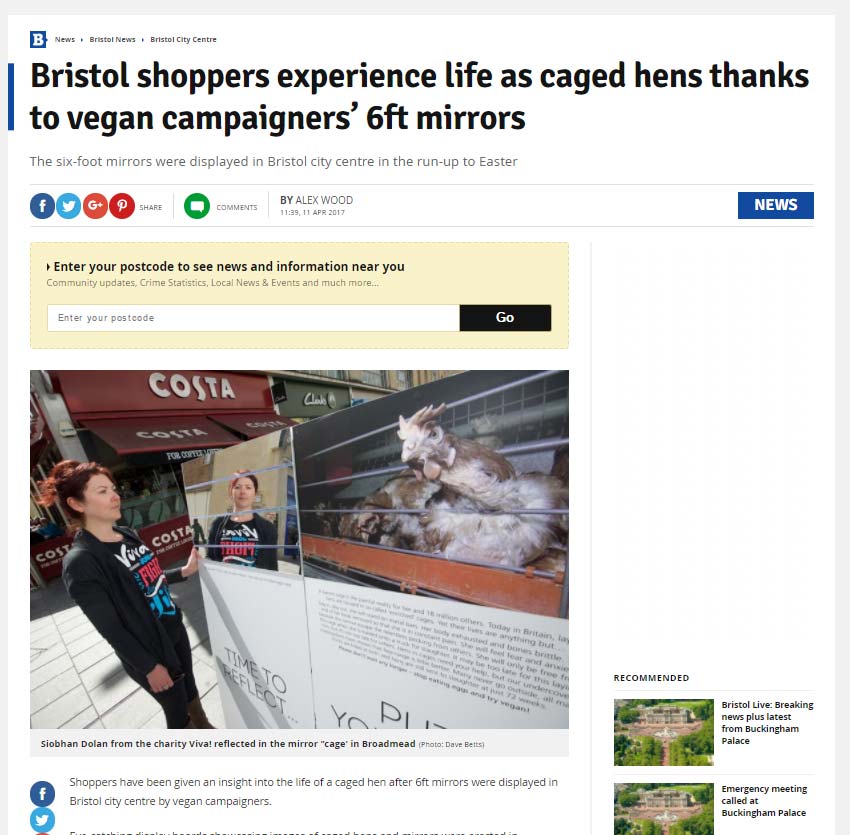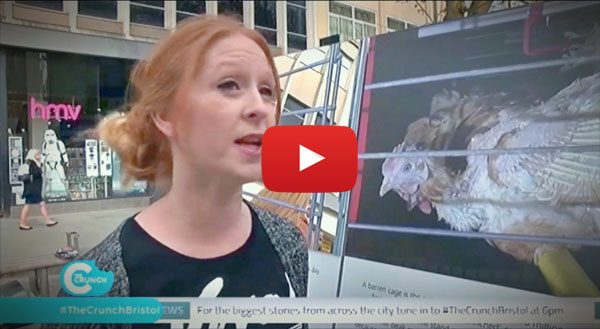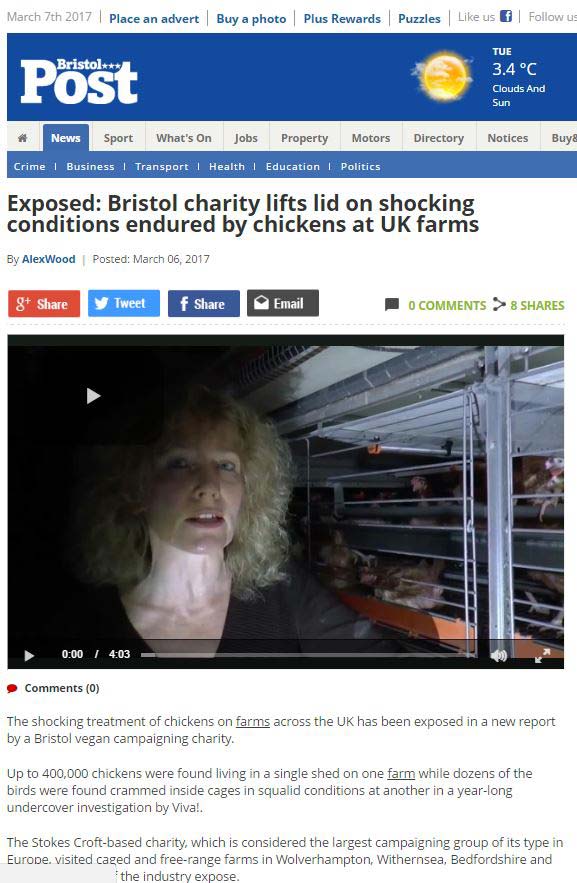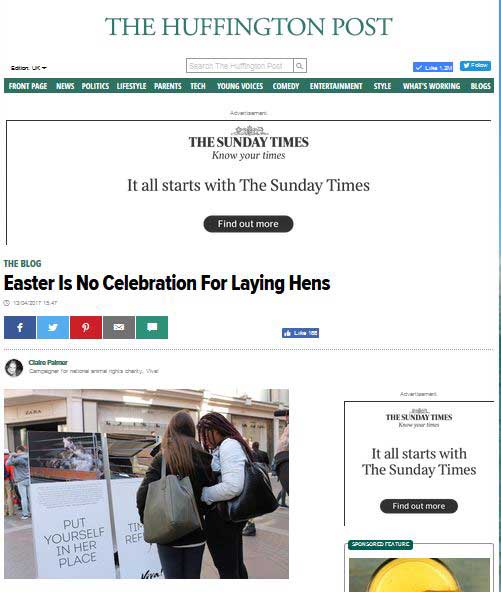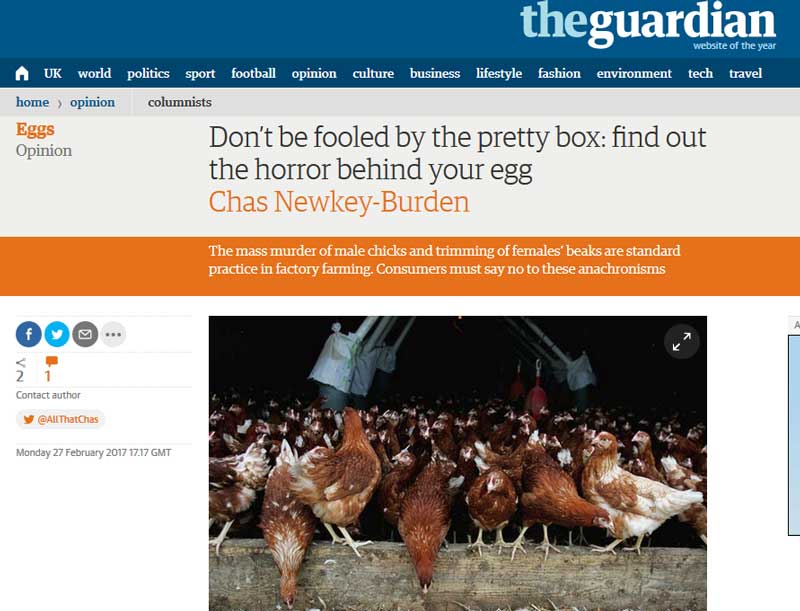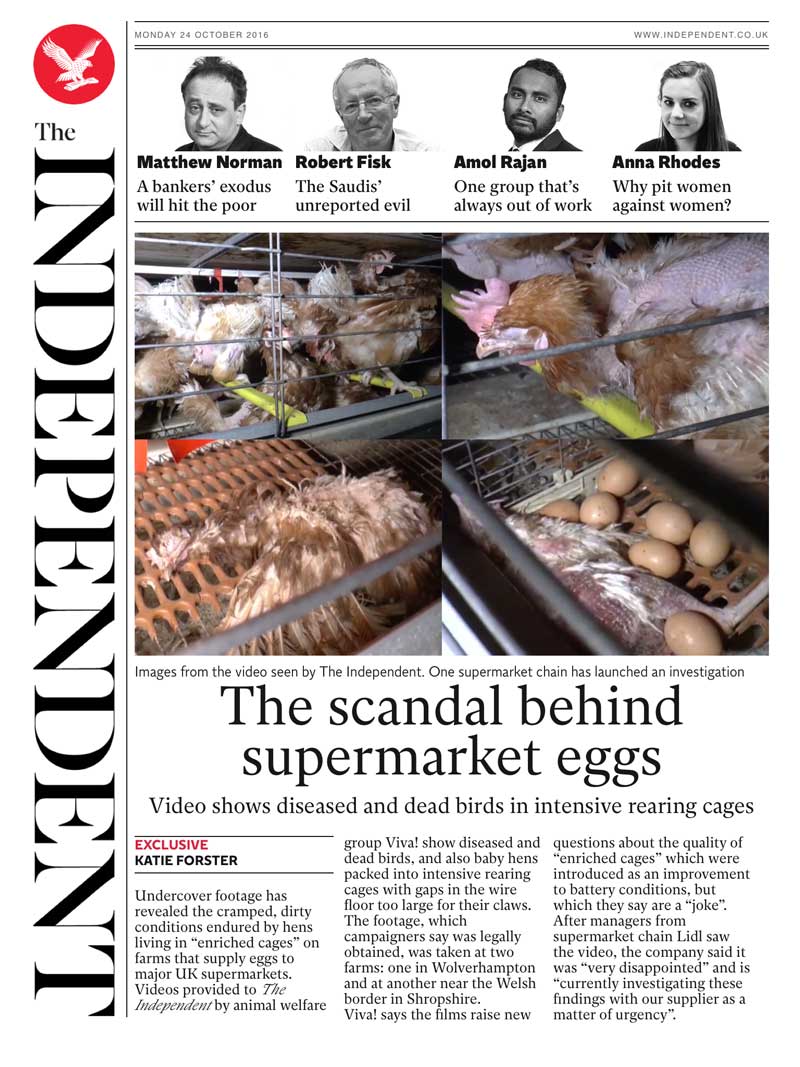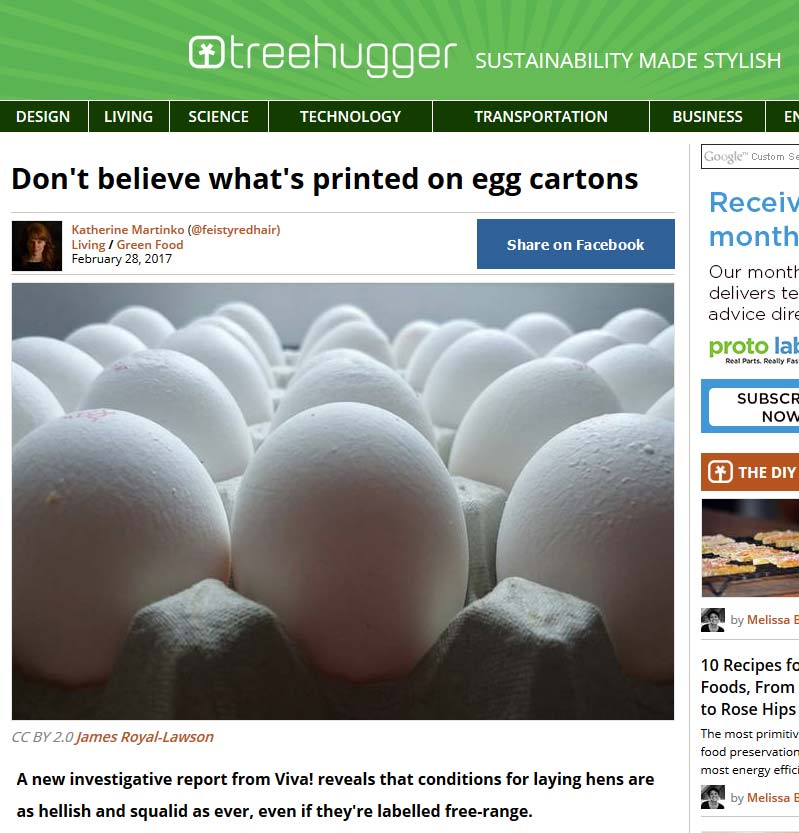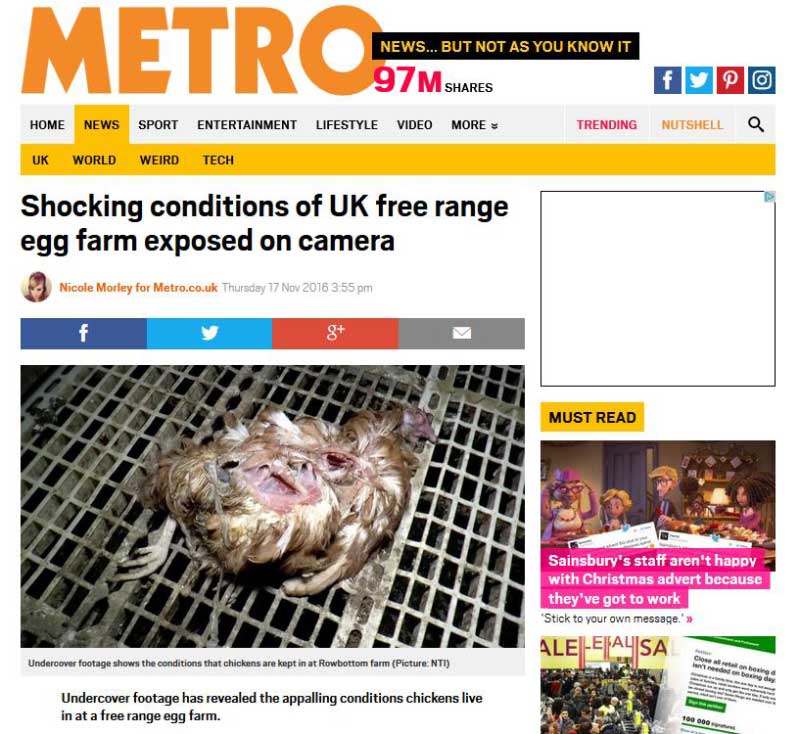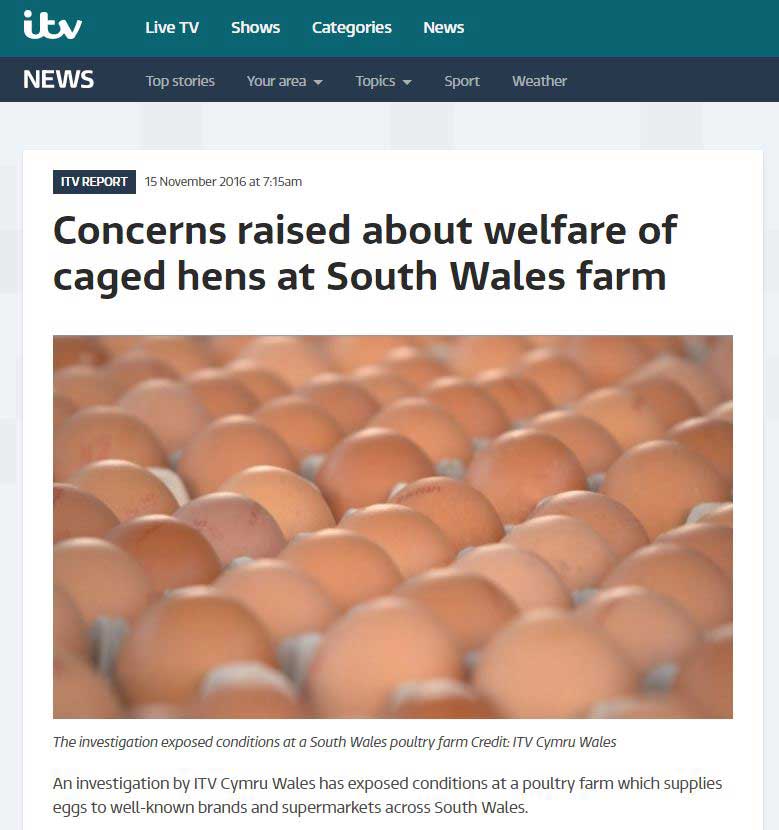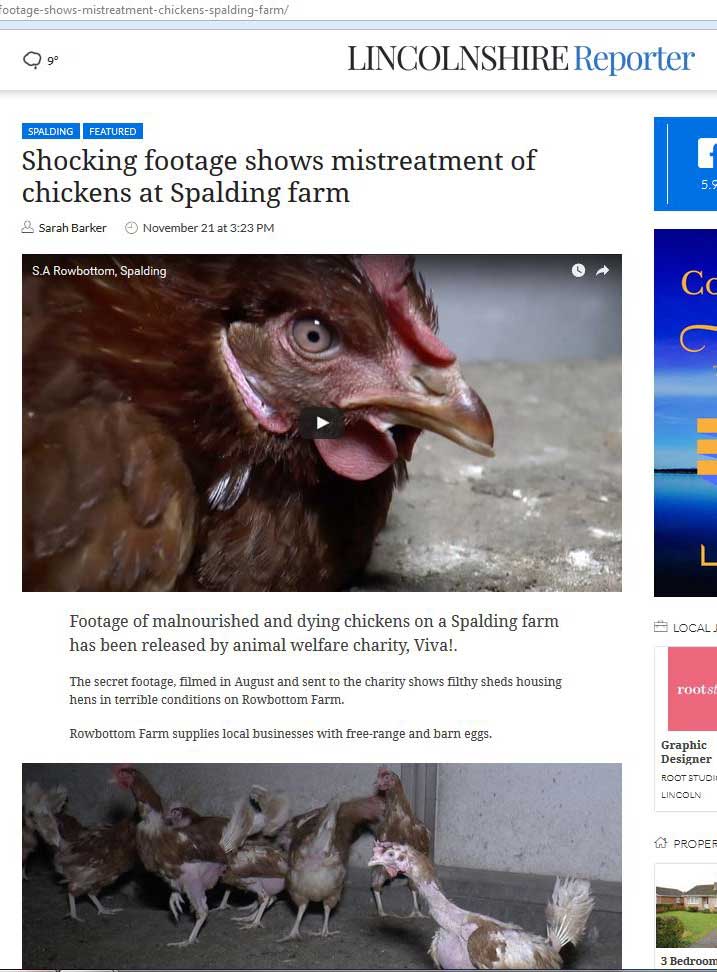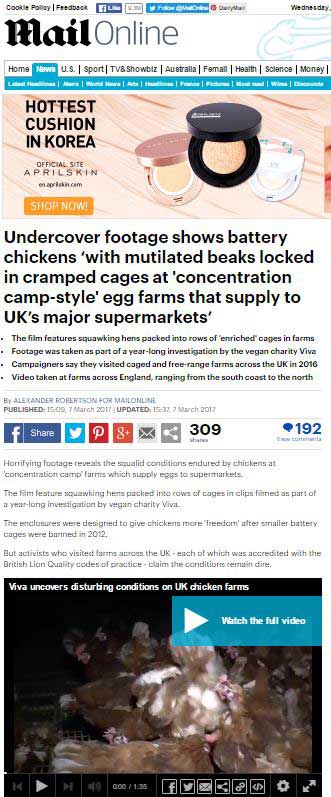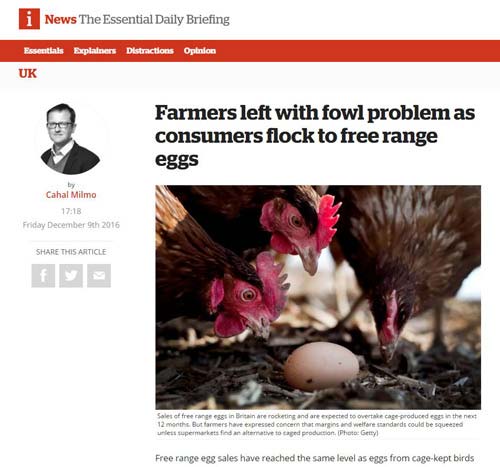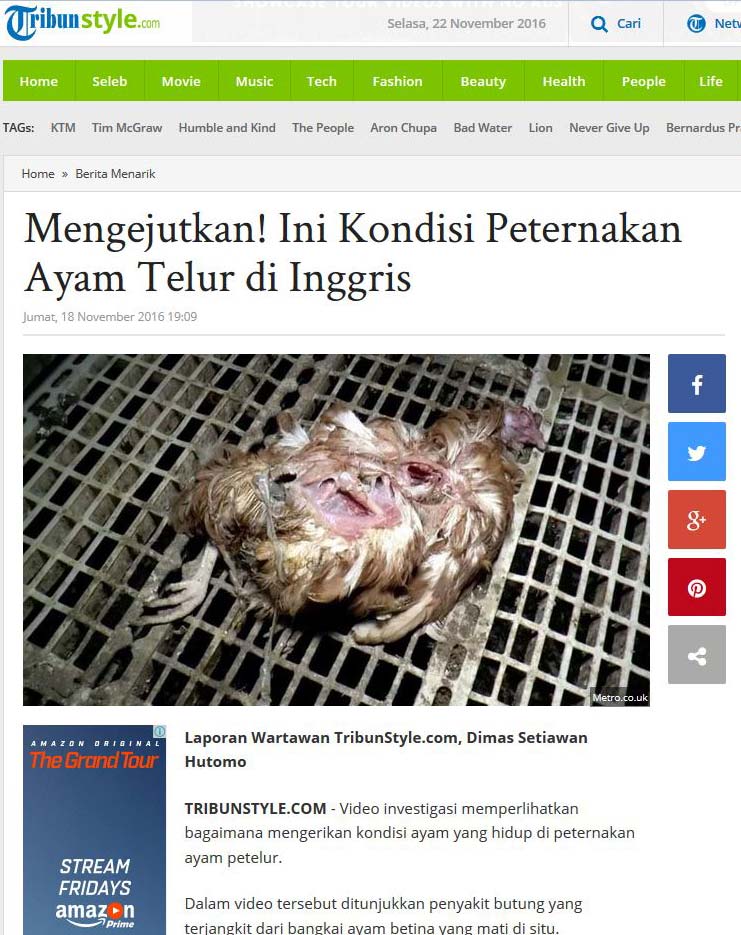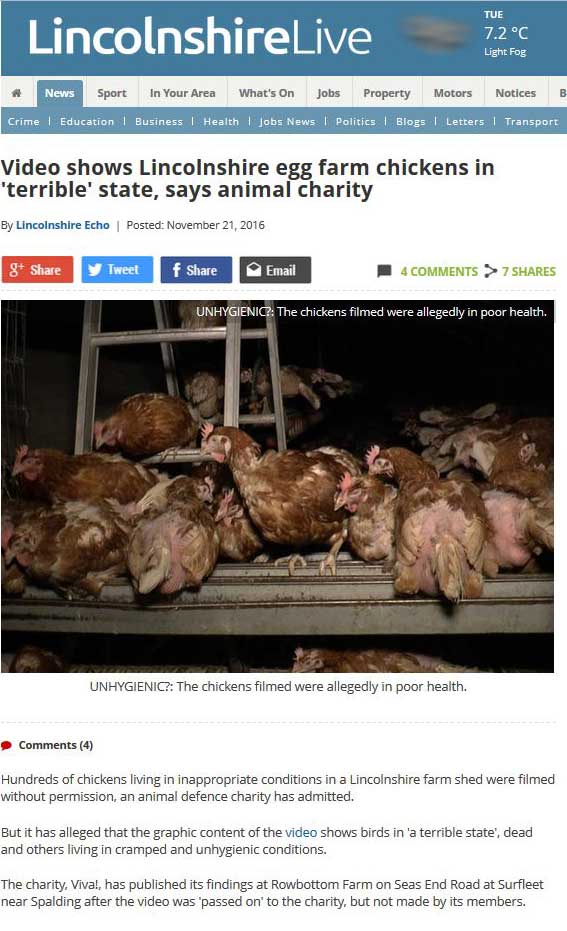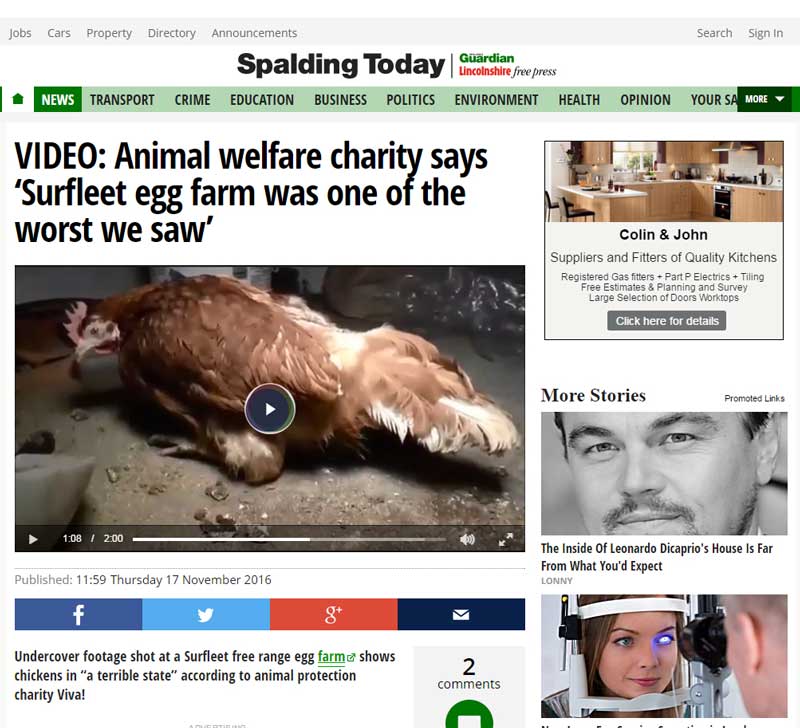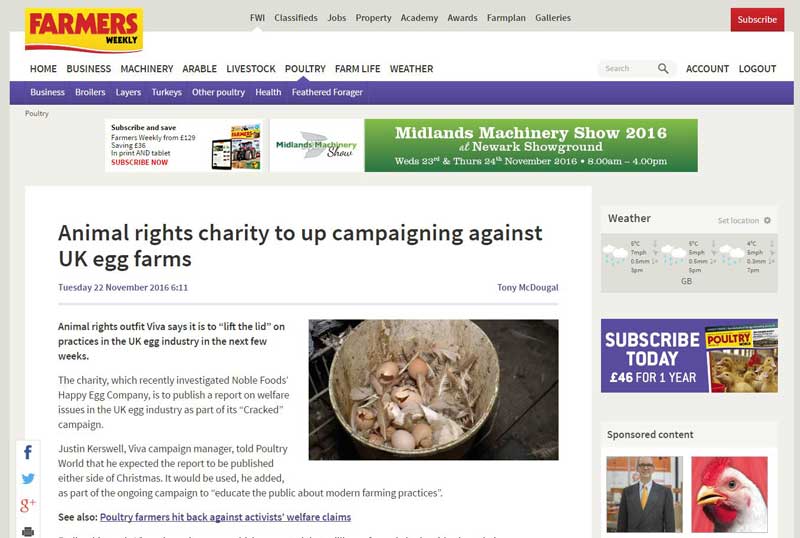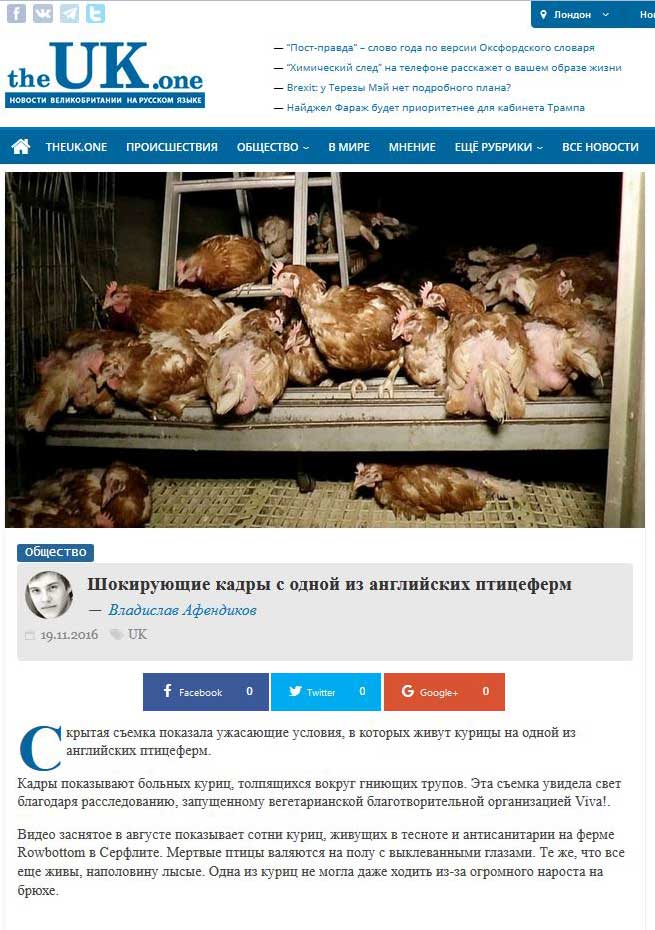Cracked
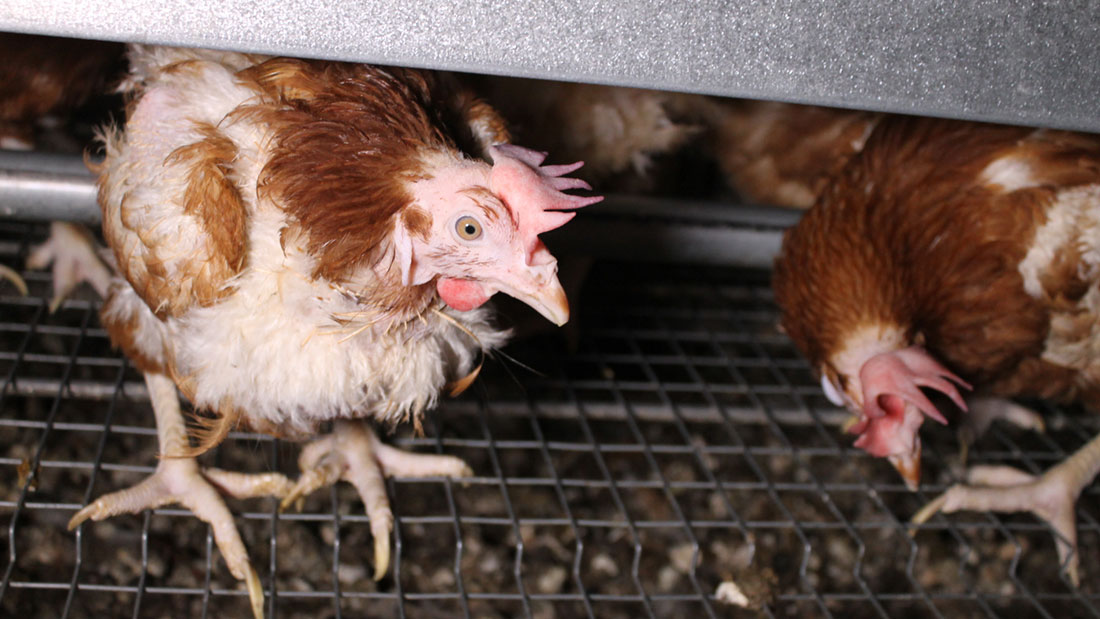
Egg consumption in the UK has been steadily growing over the past few years and currently, around 13.6 billion eggs are eaten annually – that’s over 37 million eggs a day! In 2024 alone, according to the egg industry’s own data, around 11.9 billion eggs were produced here.
The laying hen is possibly the most abused animal on earth – millions of which churn out eggs day after day in conditions that should shame our country. The vast majority of chickens, around 40 million of them, inhabit a shadowy archipelago of enormous sheds surrounded by fences and sealed off from the public. For a year, Viva! went undercover to reveal what life is REALLY like for laying hens since the 2012 ban on ‘battery’ cages. Hours of painstaking footage taken by our investigators at enriched cage, free range and organic farms has provided Viva! with a snapshot of what life is like for these birds. Our findings reveal that, no matter how they are farmed, hens lead a desperately miserable life.
Due to mounting public pressure, there has been a surge in cage-free pledges by supermarket giants. Sainsbury’s, Waitrose, Marks and Spencer and Co-op have already met their cage-free commitments. Aldi is now cage-free for shell eggs and is transitioning for ingredient eggs. Tesco, Lidl, Morrisons and Asda may complete their transitions by the end of 2025, but supermarkets like Iceland and Spar are currently at risk of missing the goal unless they accelerate their change. In the US, Walmart, Costco, McDonald’s and Nestlé have all made pledges regarding cage-free eggs. Some have met their goals, while others are still working toward them. We will provide an update on this soon.
‘No cages’ however, is not the answer. Not the one hens need anyway. Viva!’s footage from free range and organic farms shows why. What we reveal is that these systems also mean serious health and welfare problems for laying hens. Sadly, hens housed in every modern-day farming system face significant assaults throughout their entire ‘productive’ lives and a potential ten-year life span shortened to just a year and a half.
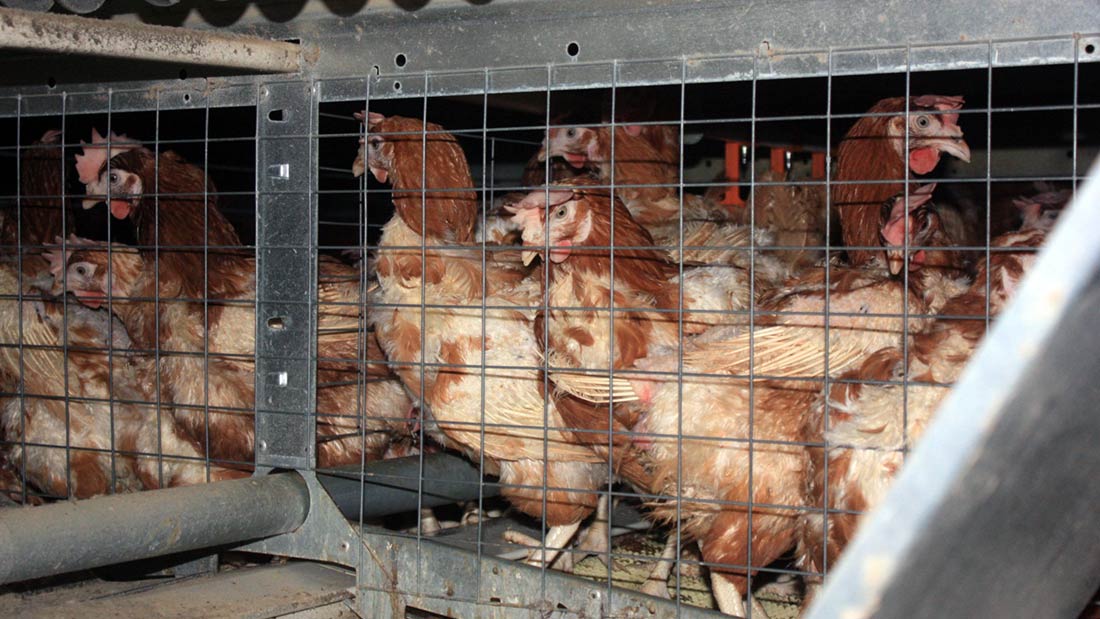
‘Enriched lives?
Just over half of the eggs from the 36 million hens alive in Britain today continue to be laid by hens living their entire ‘productive’ lives in vertically stacked ‘enriched’ cages. The enriched cage is cleverly named dupes consumers into believing that the suffering going hand-in-hand with the controversial ‘battery’ cage is a thing of the past.
And some consumers are unaware that hens are caged at all in this country …
How hens are housed on enriched cage farms
The 750cm2 enriched cage provides less than a postcard-size extra space for each bird than the now banned battery cage. A cage height of only 45 cm2 is afforded, and hens are now forced to live in extreme close confinement with up to 80 other cramped and frustrated individuals. Hens are also incarcerated for longer nowadays, and bred to lay more eggs than ever before.
The so-called ‘enrichment’ in these cages is meagre at best: A ‘dust bath’, ‘scratching pad’, perches and a ‘nest box’. Wipe from your mind though the images these words evoke! Nest boxes, for example, are flaps of plastic hanging from the cage tops, and hens must compete with others even for this pathetic offering. So much so that some individuals may never even lay an egg in one.
Enriched cages impose gross restrictions on basic movements and fail to cater for a hen’s physical and behavioural needs on a staggering scale. The floor alone is a serious welfare assault because it is sloped and made of barren wire. How is it that on modern-day farms hens must stand on excruciatingly uncomfortable and injurious sloping wire? The answer is a sad one. A sloping wire floor means eggs can easily roll to one side of the cage and onto a conveyer belt. The welfare of hens comes secondary to collecting eggs.
But it is not just the cage and furnishings that are problematic. Incarcerated hens are at the mercy of others. Widespread and sometimes lethal feather pecking is a grim consequence of cage life. And the industry’s answer? To slice or burn off the beaks of baby chicks. From birth to death, these birds are subjected to a torturous life that evolves around commodity and profit for farmers.
With mega egg companies like Noble Foods owning both enriched and free range farms, even people buying free range because they care are often unwittingly funding the suffering of caged hens.
Finally, when their time is up and they are deemed no longer of any use, laying hens are labelled as ‘spent’ and sent off for ‘processing’. This is the true cost of eggs.
Viva!’s investigation findings
Viva! investigators went inside enriched cage farms across Britain for over a year. Some of them churning out eggs for two of Britain’s largest egg companies – Ridgeway Foods and Noble Foods. Both supplying millions of eggs to consumers each week.
Our findings document an extreme form of factory farming. Suffering that was present on every farm, and in every cage. Gross conditions and similar welfare problems to those widely acknowledged to be present in battery cages around the world. Extensive feather loss, live birds walking amongst the dead, beak mutilation, birds crammed into cages with no privacy or means of escape, air thick with dust, wire cage floors covered in faeces, and sick, stressed and dying birds.
At one farm in Withernsea on the east coast of England churning out eggs for the company K Fresh and claiming to be ‘enriched colony specialists’ – 20,000 birds were housed in one huge, stinking shed. The noise here was deafening. Cages were stacked from floor to ceiling and crammed full of birds. Viva! filmed frantically flapping individuals – some with extensive feather loss – and others standing on the dead. The level of contempt by farmers for animals supposedly in their care is appalling.
Ironically, the K Fresh egg boxes are illustrated with pictures of grass, despite the fact that the company’s incarcerated birds will never feel or even see it. Our investigators left the sheds asking themselves would consumers really buy into this if they knew? Viva!’s Cracked campaign aims to ensure they find out!
Similar conditions were encountered by investigators at a Ridgeway Foods farm in Wolverhampton. As with all enriched cage farms visited by Viva!, evidence of debeaking was rife. Feather pecking is a sure sign that the housing conditions are not corresponding with the behavioural needs of hens, and a direct consequence of the inability of hens to move away from others in the same cage. Each hen at the Wolverhampton farm was once again living in a crammed, filthy cage. As with all the farms visited by Viva!, many individuals had severe feather loss, with some exposing red raw skin underneath. Some poor birds were almost entirely lacking in feathers. The cage floors were covered in faeces and littered with dead hens. Ridgeway Foods is one of the largest UK egg suppliers, stocking all the leading supermarkets.
As part of this year-long investigation, Viva! founder and director, Juliet Gellatley, visited an enriched cage farm in Bedfordshire, Bird Bros. You can watch the video and read about Juliet’s visit to the farm.
Enriched cages barely satisfy the hen’s most basic behavioural and physical needs such as wing stretching, walking, running and jumping. Birds in them certainly cannot fly. It is clear, no matter how much the egg industry tries to dress it up, this life for hens is anything but ‘enriched’.
Don’t buy eggs, you don’t need them!
Order door dropping materials HERE

44 per cent of hens in Britain are categorised as ‘free range’ (including an estimated 2 per cent organic). Competition and a high demand has led to falling egg prices and farmers housing larger flocks to yield an even greater output of eggs. Free range egg production looks set to take up an even bigger chunk of the industry over coming years also with more companies switching to cage-free. Today, European legislation permits flocks up to 2,500 birds per hectare.
Unfortunately, free range hens are free ranging in name only. We know this as we have been to free range farms before. As part of Cracked campaign, we visited a cross section of farms across Britain – from the small, selling eggs locally, to the huge – operating under the infamous names such as ‘Happy Eggs’. Some were organic, Soil Association and RSPCA-approved.
Even without the cage, the overcrowding, confinement, injuries, frustrations and death remain. Increasing demand for free range eggs means huge stocking densities and rife competition between birds. UK legislation requires small pop holes leading to a ‘range’ on the farms, though studies reveal that many hens won’t take even one step outside the vast, stinking overcrowded sheds. One piece of research in particular showed that the maximum number of hens observed outside during daylight hours at any one time was less than 15 per cent of the total flock.
Injurious feather pecking remains a widespread problem on both enriched cage and free range farms, and beak mutilation remains the egg industry’s standard ‘solution’. A ban on the practice almost came into force, but the industry has lobbied hard against it. The Chairman of the British Free Range Egg Association (BFREA) stated: “We must keep lobbying our MPs so that they are fully aware our industry is not ready for this legislation to be put into place”. This sounds like an admission that free range farming is no good for hens!
A 2010 investigation by Viva! at a large free range ‘Happy Egg’ farm revealed the few hens who did make it outside onto the waterlogged range were scrawny, had poor feather cover, and appeared ill. Inside the sheds, sick, collapsed and featherless individuals were living amongst thousands of other birds. An excruciating and obviously severe red mite infestation had also taken hold.
Laying hens on organic farms are categorised as free range but with additional standards set out by an approved certification body. Under the Soil Association label however – supposedly one of the strictest organic welfare standards in the world – young hens (pullets) can be housed inside for up to 18 weeks. At an organic rearing farm, the health of these so-called higher welfare individuals may also suffer due to the absence of routine antibiotics. Organic laying hens of course also end up in the slaughterhouse. Later than the usual 72 weeks, yes, but still as young birds who would live years in the wild.
The public are being sold a carefully constructed lie. Buying free range is buying into industrial farming. An industry that supports the mass killing of baby male chicks. 40 million annually. And a life of misery for hens, painful mutilations, a terrifying journey to the slaughterhouse and a brutal death for the so-called ‘spent’ hens. This is the true cost of eggs.
Investigation findings
Viva! visited free range and organic farms across Britain. Including those operating on behalf of one of the top egg producers, Noble Foods. A company that supplies 60 million eggs a week. Chickens in the wild would typically live in small flocks, yet on some free range farms visited by Viva!, hen flocks ran into many thousands.
In appearance, the sheds are similar to those housing hens laying ‘barn’ eggs. Our investigators found that the hens, whilst uncaged on free range farms, had comparable feather loss to hens on enriched cage farms. It was unclear during the investigation which hens went outside during the day, though studies show that many hens living on free range farms never go outside because of high stocking densities, competition for access from other birds, and inadequate outside conditions. Hens can be fiercely territorial and will guard the exit holes!
Each farm visited by Viva! investigators revealed hens living in the same dismal, hellish environment. At one farm in Spalding supplying eggs to local retailers, the floor inside the shed was gridded metal and the air thick with dust. Extensive feather loss was observed on many individuals. Dead birds were filmed both inside the shed, and also piled on top of each other in a bin outside. These bodies were swarming with maggots and flies. Viva! sent findings to veterinarian, Dr Andrew Knight, who commented: “Carcasses represent both an infection hazard, and also a food source for rats, which can then attack living hens, especially if ill or weak”.
On another free range farm, Viva! investigators found a bird who was clearly very sick. She was swaying on the spot and apparently unable to walk. Dr. Knight commented, about birds with severe feather loss: “An immediate consequence of this extent of feather loss is an inability to thermoregulate (stay warm) unless fat, but subordinate (pecked) birds might also have less access to food .. another common consequence from persistent pecking is skin injury and ultimately cannibalism”.
An organic free range farm visited by Viva! investigators in East Sussex is considered a ‘model’ farm and has received the Compassion in World Farming Good Egg Award. It also carries the seal of approval from RSPCA. Whilst conditions were arguably better here than on other farms we visited, similar problems were documented such as feather loss and the overcrowding of sheds. There was also a hen with a deformed beak and a dead hen lying on the filthy floor.
At an organic, free range farm stamped by Soil Association in Wiltshire, there were two sheds each housing around 2,000 hens. Birds here were observed with sore-looking, bald patches on their backs and abdomens. Possibly the result of a mite infestation. At another RSPCA-Assured, organic and free range farm in Lincolnshire, birds were housed in a packed out shed. Some were balancing precariously on thin wire running along the rafters, possibly to escape the sea of birds below.
The sad reality is, many of these birds are unlikely to ever see the sunlight or walk on grass.
Don’t buy eggs, you don’t need them!
Order door dropping materials HERE
Viva! goes undercover inside so-called ‘free-range’ Spalding egg farm

Viva! encourages people to see hens and other animals not as commodities, but individuals with complex personalities, and a right to live free from suffering and harm!
If you are lucky enough to live on, or visit, a sanctuary that cares for hens, or live with a hen in your own home, please take a photo! We would love to see and share your pictures.
You may know a hen with a special personality, or a heart-warming story, so why not share it with us! Help us show how personable and huggable hens are!
Send your Hug-a-Hen pictures and stories to info@viva.org.uk.
Chantilly
Gina, founder of the amazing New Life Animal Sanctuary in the United States has sent in this gorgeous video of Chantilly the hen.
Chantilly didn’t come from a farm, but instead was rescued with 16 others from an academic ‘Science Center’. She loves to cuddle and take naps on the couch with Gina. In the chicken yard, Chantilly will approach Gina and tap her gently with her beak to let her know she wants to be picked up and cuddled. Chantilly will sit on Gina’s lap for hours and is very responsive when spoken or sung to!

Dahlia and Brenda
Meet Dahlia and Brenda! Both were rescued from the confines of a cage. After recovering from her ordeal, Dahlia developed a passion for flowers. She would sneak through the gate into the yard by the house, jump into the nearest flowerpot and proceed to slowly remove all the petals, stopping only to have a little sleep before finishing the job.
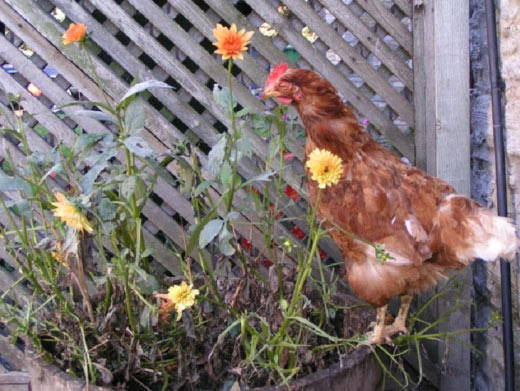
Brenda had a different hobby. After breakfast she would fly over the gate into the sheep barn to spend a few hours sitting on Nana, her favourite sheep. Not only did this keep her feet warm but she could always find small treats of food in Nanas’ fleece, bits of oats and barley that had been dropped by the other sheep.
No other sheep would do as a cushion though, it had to be Nana!”
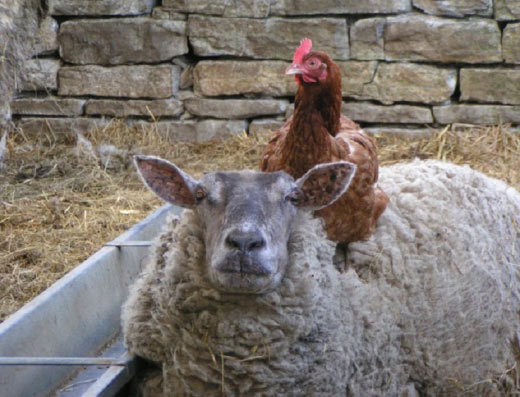
Hatty and Mark
Hatty arrived on F.R.I.E.N.D Sanctuary in Kent last year in a terrible state. She was exhausted and almost entirely bald from feather pecking by other birds. Some of you may be surprised to learn that Hatty had been living on a so-called ‘free-range’ farm.
But now she is truly free, and can choose how much time she spends in the company of other birds! She will also never be sent to slaughter.
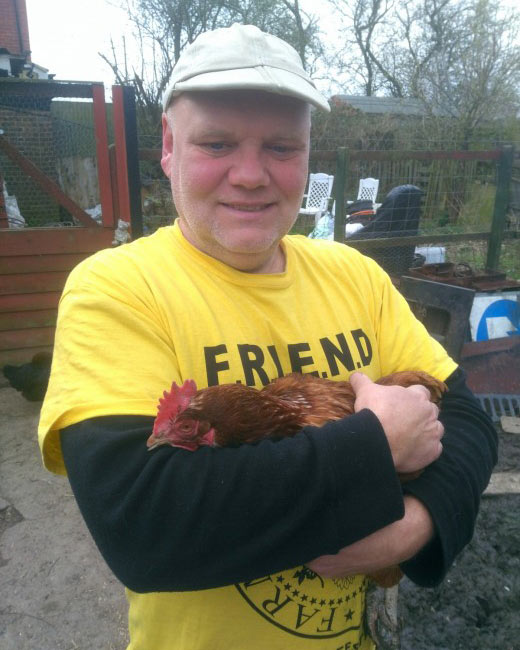
Unknown hen (Dean Farm Trust)
Guy Harper, our extraordinary #voicelessforviva fundraiser, went silent for the entire month of February and raised a phenomenal £1,840 for Viva! He was completely voiceless for a whole twenty-eight days and, on the day he spoke again, he was joined by Juliet from Viva!, Hope Apple Blossom, and her babies at the Dean Farm Trust.
He also took some time out to hug some hens! Here he is with one of the lucky rescued hens at the sanctuary.

Liv with rescued hen
Liv, 14 of Gloucester visited Dean Farm Sanctuary with Viva! founder and director, Juliet, in April 2017. She decided to go vegan so it was a truly Happy Easter for the hens!
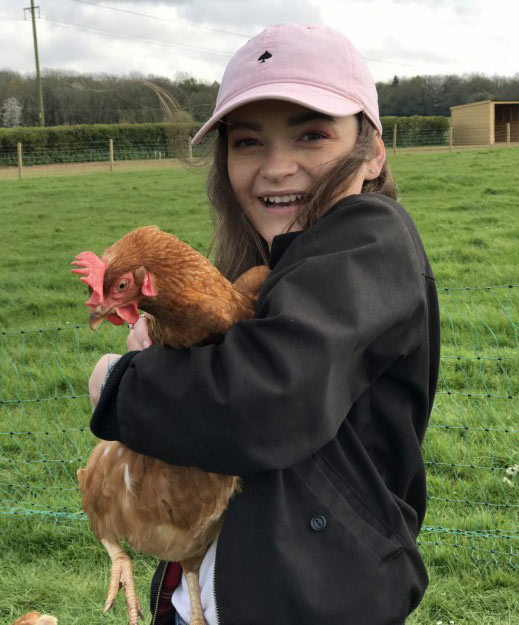
Rosie Scott and Lucy the hen
“After both being a vegan for a full year, me and my fiancee volunteered with the Amish community in Ohio on a communal hippy bus trip for one month, where we tried to educate the Amish community on veganism and volunteered gardening on the farm for a man who was terminally ill, and was surprised to find the local Amish shops with discounted vegan products (mayo, quinoa/almond/soy milk, chocolate) … even though we had no success with the family we were staying with on veganism, they were very curious on the lifestyle and ate lots of accidental vegan products such as mayo with us.
There was one particular chicken – LUCY, who was the happiest little chicken in the world, she purred as I stroked and cuddled her to sleep every night, she waited outside my tent until I woke up, I hand fed her and fell truly in love with her. Although I had been a vegan for a full year, and now two years, I never knew how truly close I could feel towards a chicken. We really are connected – all beings to another. The Amish family promised me nothing would happen to her, as she was so special to everyone.
I can never understand how anyone can hurt a being, but seeing how wonderful these animals are in my own eyes on a farm, devastated me. Seeing the pigs cuddling in their pen to sleep and hearing them squeal with happiness as I stroked them every morning, and seeing my favourite chicken Lucy being hand fed …
I will never stop trying for all animals, but Lucy truly brought me into tears, how could an animal be so beautiful, and how could the Amish family we lived with for a month fall in love with her also, but continue to eat ‘pet’ chickens and meat baffles me.
I don’t understand why everyone doesn’t see the connection, but until then I will always continue trying … for Lucy.”

Finn hugs a hen
This happy and healthy hen was rescued by Dean Farm Trust and is being hugged by teenager Finn from Chepstow, Wales.
Viva! encourages people to see hens and other animals not as commodities, but individuals with complex personalities, and a right to live free from suffering and harm!
If you are lucky enough to live on, or visit, a sanctuary that cares for hens, or live with a hen in your own home, please take a photo! We would love to see and share your pictures.

Unknown hen (Dean Farm Trust)
Viva! recently rescued a family of pigs from Dean Farm Trust. At the sanctuary, Viva! festivals and events manager, Sophie Delarny, hugged this lucky hen!
As you can see, both hen enjoyed affection!

Send us your pictures
Let us share your pictures and stories to help people see that hens are not just egg-laying machines, but sensitive, affectionate and huggable birds!
If you can’t get to a sanctuary for hens like Brenda and Dahlia, why not adopt a hen! Viva! runs an adoption scheme with The Farm Animal Sanctuary.
Visit www.adoptafarmanimal.org.uk for more information.
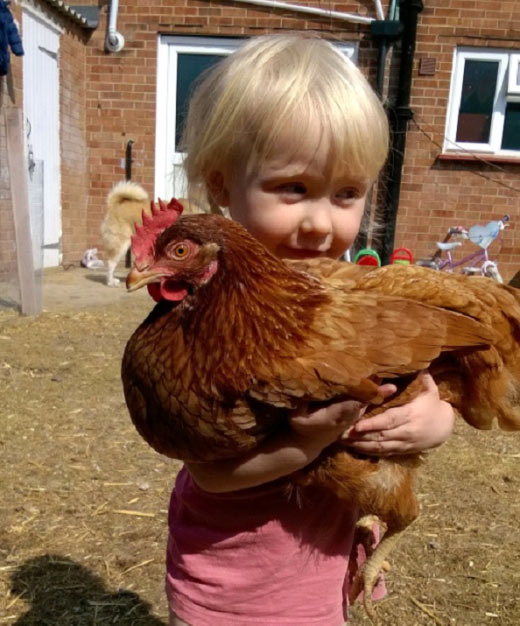
Easter action for hens
Order free leaflets
Viva! is kick-starting Easter with a WEEK OF ACTION for laying hens as part of our Cracked campaign.
During the week leading up to Easter Sunday Viva! is launching a series of actions around the country not only to show our undercover footage using our new virtual reality headsets, but also to encourage people to actually put themselves in the place of hens who lay eggs for the dinner table. We want people to find out what it feels like to be a factory-farmed animal.
You may have heard some supermarkets are to phase out cages for laying hens – but this is not for many years. Viva!’s Cracked campaign though shows that free-range isn’t the answer. Most free-range hens remain incarcerated in huge sheds and never go outside. The answer to ending the cruelty is to go vegan – and at Easter we will be offering free help for people to do just that.
You can join us in our Easter Action For Hens by door dropping our Cracked leaflets (100 leaflets per pack). Order yours today.
Remember you can also visit the Viva Face off page VIVA! FACE OFF PAGE >> and download our footage to show to others!
Sign the petition
Sign today to raise awareness on the killing of 40 million day-old male chicks a year in Britain. Killed simply because they considered the ‘wrong sex’!
Currently, the vast majority of baby male chicks are gassed to death. This horror plays out every day across the UK to bring eggs to the morning table and is part and parcel of every type of egg production – from the most organic to the most intensive.
Ban the practice of live male chicks being killed by grinding and suffocating by signing here.
Viva! has exposed this cruel practice in the past. Read more and watch the video here.
Without this mass slaughter the egg industry couldn’t survive. Avoiding eggs altogether is the only sure-fire way of not contributing to this suffering!
Egg laying hens
Over the coming weeks, Viva! will launch the findings of undercover investigations into the life of Britain’s laying hens as part of the new Cracked campaign. Our team of investigators went undercover in free range, organic and enriched cage farms across the country for over a year to show you what life is really like for hens in since the ban on battery cages. What we found was a hopelessly cracked industry built on profit and exploitation that causes pain and suffering to hens on an almost unimaginable scale.
Watch Juliet face off against the British egg industry
If you think that so-called ‘enriched cages’ have made life better for Britain’s hens then think again.
Juliet Gellatley lifts the lid on this secretive industry with a ground-breaking undercover investigation…

The Happy Egg Company
Watch Viva!’s shocking undercover investigation into conditions at The Happy Egg Company

Enriched cages
Viva! investigates: A cage is still a cage
Another side of egg production was the battery cage – a byword for cruelty for decades.
However, they are now being replaced across Europe by – yes you guessed it – another cage. Optimistically described as ‘enriched’, hens are still packed into wire prisons – prisons with a little more space. There is some cursory ‘environmental enrichment’ but there is no escaping the fact that it is still a cage.

Hatchery investigation
Viva! investigates: Conveyor belt of death
Hatcheries across Britain produce millions of hens to replace their ‘worn out’ sisters (most killed at just 72 weeks), but not every bird makes it out of the hatchery alive. To be precise, half of them don’t. The fate of male chicks was one of the egg industry’s best kept secrets – until now.





